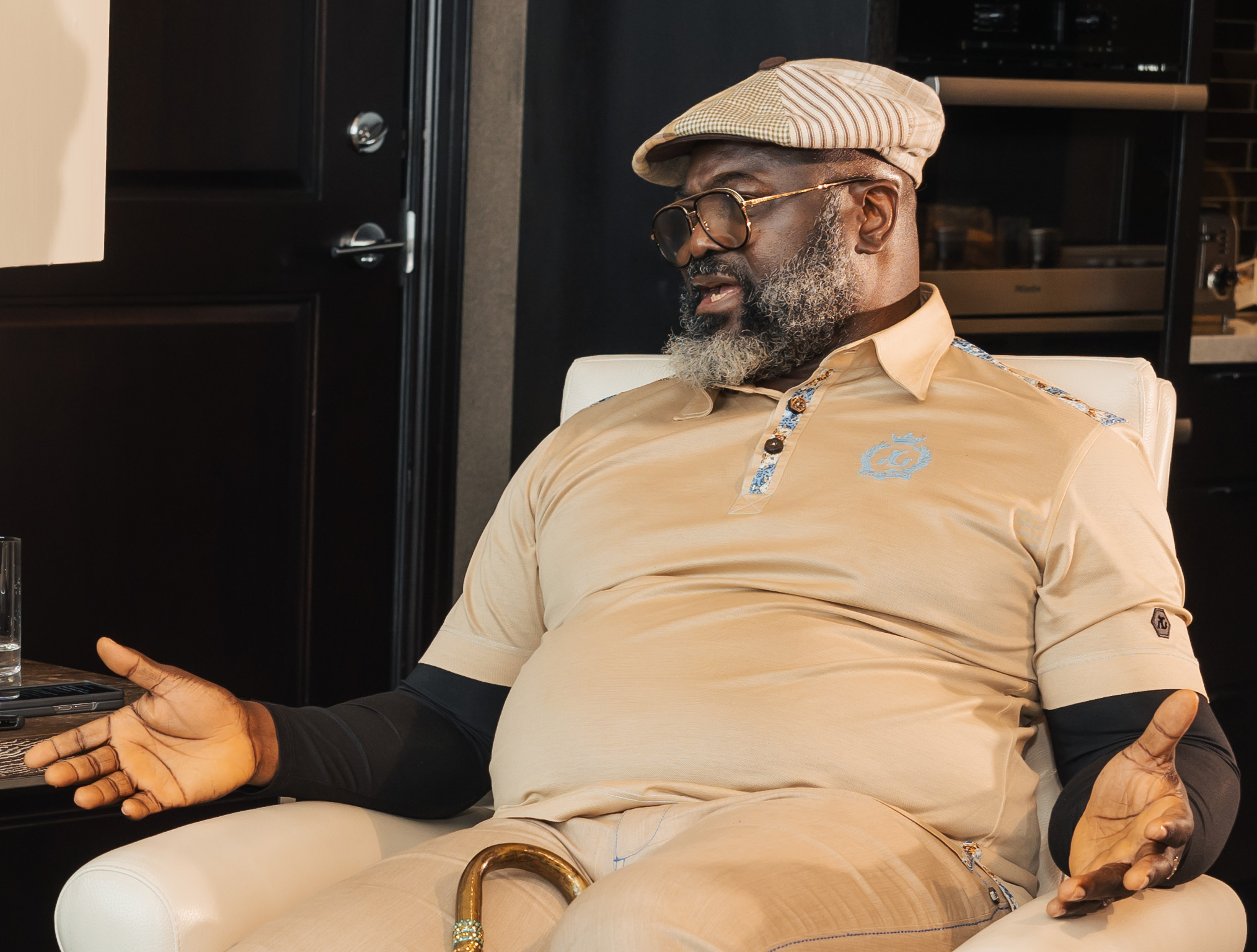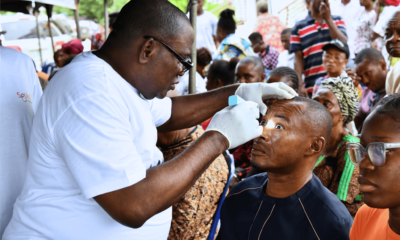NEWS
We Aim To Have Zero Gas Flares By Q4 2024 – Dumo Lulu- Briggs

Chief Dumo Lulu-Briggs, Lawyer, Philanthropist, and Nationalist is the Chairman of Platform Petroleum, on the sidelines of the just concluded Offshore Technology Conference, OTC, in Houston Texas, USA, shared his experience on his early days and foray into the oil and gas industry, his challenges, and success story of growing a small indigenous oil company into a household name in Exploration and Production. Excerpts;
Kindly give an overview of your journey into the petroleum industry and how it dovetailed into your current position as the chairman of Platform Petroleum.
After earning a Law degree from Ahmadu Bello University and a Masters from the University of London, I attended law school in Nigeria and briefly practiced law in Lagos.
Drawn to politics, I moved to Port Harcourt, where I tried local politics and ran a pub, displeasing my father. To satisfy him, I co-founded a law firm. Later, my father encouraged me to join his oil business, despite my lack of experience. I was initially interviewed for a legal adviser role but was appointed General Manager instead.
Recognizing unfavorable agreements with our foreign partners, I sought advice from Austin Avuru, who became a key advisor.
Avuru’s expertise led us to establish Platform Petroleum, gathering a team of experienced Nigerian professionals. We started with His Royal Highness Edmund Daukoru as our first chairman and Prof. Sylvester Adegoke as our Vice Chairman, then I came onboard just as a shareholder.
In 2004, former President Olusegun Obasanjo appointed Daukoru as Adviser first then later as a Minister and that was how he left Platform Petroleum. That was how Prof. Sylvester Adegoke became Chairman, and I became the Vice Chairman.
In 2011/2012, I became chairman, and I am the chairman till date.
Our strategic partnerships and renegotiated agreements helped us thrive. We began with minimal resources but secured investments and funding through innovative financial strategies. By 2007, we commenced oil production, achieving significant success from our small field.
My collaboration with Avuru was pivotal, transforming our company into a strong indigenous player in Nigeria’s oil industry. That is how I got into the oil and gas industry which I had no prior knowledge on. This journey, though initially reluctant, became deeply fulfilling and impactful.
Can you elaborate on the collaboration with New Cross and its impact on Platform Petroleum?
Our relationship with New Cross was a game changer and quite mutually beneficial.
Having JV partners like New Cross makes operations smoother for marginal field operators. With 100% collaboration and transparency, we quickly earned New Cross’s confidence, leading to minimal questioning from them. We worked together on many projects, including setting up the Ase River crude evacuation pipeline, a crucial 24-kilometer infrastructure to the Brass Terminal.
We proposed a 50/50 JV with New Cross, diverging from the typical 60/40 arrangement, and successfully built the pipeline, benefiting our cluster partners and generating additional revenue through tariffs.
Our partnership with New Cross extends to both upstream and midstream ventures, including PNG Gas Limited, a significant LPG player in Nigeria, producing 30,000 tons of LPG and 30,000 million standard cubic feet of gas. This collaboration has been incredibly rewarding, marked by open, meaningful conversations and mutual understanding, ensuring we always move in the same direction without conflict.
What have been the challenges and key milestones achievement during this journey?
We were the smallest in 2004 but we were the first to bring our field on-stream and we have been producing that small asset. We have increased our oil production from 2,000 to over 3,000 barrels. Today, we have been able to extract at least some 12.3 million barrels and 118 billion standard cubic feet (SCF) of gas from that small asset and we are still on. We aim for 10,000 barrels, having expanded into three additional marginal fields.
From the start, we decided to run Platform as a family, treating everyone with importance and fostering a highly motivated workforce. We address issues affecting our staff, ensuring their welfare, and maintaining a supportive environment. This familial spirit extends to all stakeholders and communities, with a commitment to exceeding expectations in community spending. Our journey has been both rewarding and challenging.
Do you have a timeline for the 10,000bpd target?
We aim to bring all marginal fields into production by 2025, targeting 10,000 barrels of oil and at least 50 billion standard cubic feet of gas per day. To mitigate the volatility of the oil and gas industry, we have diversified into non-E&P ventures. As a small company, price fluctuations can significantly impact us unlike larger players like Seplat.
So, we have invested in real estate, building a 19-story Towers, and expanded into logistics and leasing. We are involved across the entire value chain; upstream, midstream, and downstream, operating service stations in Lagos, Warri, and Port Harcourt, and exploring refining opportunities.
Despite our size, we have achieved significant success and efficiency, proving that a small company can accomplish big things effectively.
Do you plan to take advantage of the upcoming licensing bid rounds?
We are very ambitious because we want to become a tier-1 company like the IOCs or a tier-2 company like Seplat. Interestingly, Seplat originated from Maurel & Prom, Shebah Petroleum, and Platform. We capitalized on the first divestment, and today, Seplat is a major player. This demonstrates that Platform can also grow significantly.
We have planned a roadshow in London this June 2024 to explore opportunities arising from various divestments. Although we were unsuccessful in the 2020 marginal field rounds, our contributions to the industry are substantial. We have three fields set to start production by 2025. We funded these projects, provided expertise, and identified promising assets. Successfully bringing these fields to production will boost national output and validate our efforts.
We believe Platform deserves recognition and more assets. Our roadshow aims to attract equity partners and prepare for future opportunities. We are targeting a billion-dollar investment, engaging equity players, junior debt providers, and international banks. We seek partners ready to invest in Nigeria’s oil and gas potential.
We emphasize Nigeria’s vast opportunities and actively bring investors to showcase the country’s potential. The current government is proactive, understanding the need for economic growth. Platform is prepared to leverage every opportunity in the oil and gas industry to contribute to this expansion.
Platform Petroleum played a prominent role at the Nigerian Pavilion during 2024 OTC here in Houston, does it align with the company’s strategic growth?
Yes, it does. The Offshore Technology Conference (OTC) is a ritual, and everyone knows Nigeria has vast potential. With the shift from fossil fuels and the IOCs divesting from onshore assets, it is crucial to promote Nigeria as a significant market. Partnering with the Petroleum Technology Association of Nigeria (PETAN) at OTC is key to attracting investment. To grow Platform, we need investor confidence and funding.
While we support net zero gas flaring, we emphasize Nigeria’s energy needs and our unique perspective to the global community. This approach can open financial opportunities.
At the OTC through PETAN, our aim was to boost investor interest, recognizing PETAN’s pivotal role. Their events have drawn significant attention, indicating growing interest in our message. For Platform, we have always allowed the optimism of our will to triumph the pessimism of our intellect.
Challenges may seem insurmountable, but we believe in our inner strength. My father’s experience in the oil industry exemplifies this spirit. Despite initial setbacks and risks, his faith and determination led to success.
Through professional support and renegotiated agreements, our business became profitable. We will continue to channel this resilience, promoting Nigeria’s energy sector and seeking the right investment mix for future growth.
What is the long-term vision of Platform Petroleum and how can it contribute to energy security and economic development of Nigeria?
As I mentioned earlier, we are conducting a roadshow in London. We are efficiently producing our assets, upgrading flow stations, increasing capacity, and achieving nearly zero emissions. Currently, we have about one percent gas flare, and by the last quarter, we aim to have zero gas flares, becoming the first indigenous company to commercialize our gas. We are aligned with government aspirations, supporting their targets, and preparing to attract a billion-dollar investment to help achieve 30 billion standard cubic feet of gas production.
Nigeria is a big market, and we must think big. This government’s plans, like the Lagos-Calabar coastal line, reflect that mindset.
We should have faith in our country. At Platform Petroleum, we are readying ourselves for divestment opportunities to become a tier-2 player. We are in talks with some IOCs.
Platform’s contribution to Seplat’s success is notable; Mr. Avuru, our former MD, was seconded to Seplat, which highlights our capability. We aim to take Platform to the next level, building on the strong foundation we have established.
Seplat has set a precedent, and we are poised to follow.
NEWS
Dangote Refinery Cuts Petrol Price To ₦970 per Litre For Marketers
The Dangote Petroleum Refinery has announced a reduction in the price of Premium Motor Spirit (PMS), also known as petrol, to ₦970 per litre for oil marketers.
This new price, effective immediately, marks a ₦20 decrease from the refinery’s previous ex-depot price of ₦990 per litre, which was set earlier this month.
In a statement released on Sunday, Anthony Chiejina, the refinery’s Chief Branding and Communications Officer, explained that the price reduction is a way for the company to express its appreciation to Nigerians for their unwavering support in making the refinery a reality.
READ MORE: NDLEA Nabs Businessman For Using Ingestion To Smuggle Cocaine
“This decision is our way of thanking Nigerians for their unwavering support in making the refinery a dream come true,” Chiejina said.
The statement also highlighted the refinery’s gratitude towards the Nigerian government, acknowledging the role of government measures in supporting domestic businesses.
“In addition, this is to thank the government for their support, as this will complement the measures put in place to encourage domestic enterprise for our collective well-being,” the statement read.
Despite the price cut, the refinery reassured consumers that there would be no compromise on the quality of its products. “While the refinery would not compromise on the quality of its petroleum products, we assure you of best quality products that are environmentally friendly and sustainable,” the statement added.
The company also committed to ramping up production to meet domestic fuel consumption and alleviate concerns over potential supply shortages.
“We are determined to keep ramping up production to meet and surpass our domestic fuel consumption; thus, dispelling any fear of a shortfall in supply,” the statement concluded.
The price reduction is expected to save marketers approximately ₦20 per litre on purchases from the refinery’s Lekki-based plant.
NEWS
I Am Just A Content Creator – Simon Ekpa Denies Biafran Leadership Role
Simon Ekpa, a Finnish citizen of Nigerian descent and a controversial figure in the Biafran separatist movement, has dismissed his self-styled title of “Prime Minister of Biafra” as inconsequential.
Speaking during legal proceedings at the Päijät-Häme District Court in Finland, Ekpa stated, “I am just a content creator; the issue of Prime Minister of Biafra is not serious.”
READ ALSO: National Assembly In Top Gear For Tinubu’s 2025 Budget Presentation
Ekpa’s statement comes in the wake of his arrest by Finnish authorities on charges related to incitement of terrorism.
The Finnish National Bureau of Investigation (NBI) has accused Ekpa of public incitement to commit crimes with terrorist intent.
The arrest stems from an incident in Lahti on August 23, 2021, and officials are also seeking the detention of four other suspects linked to the case.
“The detention demands are related to a preliminary investigation in which a Finnish citizen of Nigerian descent, born in the 1980s, is suspected of public incitement to commit a crime with terrorist intent,” the NBI said in a statement.
Ekpa, who has used his social media platforms to advocate for Biafran independence, has been a divisive figure in Nigeria’s southeast region.
His rhetoric and actions, including calls for economic shutdowns through “sit-at-home” orders, have been linked to widespread unrest and disruptions in the region.
NEWS
National Assembly In Top Gear For Tinubu’s 2025 Budget Presentation
The National Assembly management team, led by Clerk Sani Magaji Tambawal, has ramped up efforts to ensure a seamless presentation of the 2025 Appropriation Bill by President Bola Ahmed Tinubu.
The event, scheduled for a joint session of the Senate and House of Representatives, is regarded as a significant moment in Nigeria’s legislative calendar.
Preparations include a thorough inspection of the assembly chambers to ensure all facilities are fully functional.
READ MORE: PDP Governors Probe Ondo Polls, Criticizes Edo Result
Deputy Clerk Kamoru Ogunlana, who is overseeing the technical arrangements, confirmed that key systems, including microphones, sound equipment, and other audio-visual tools, have been tested to ensure smooth communication during the session.
“We are working tirelessly to ensure that the National Assembly is fully prepared to receive Mr. President and provide a conducive environment for this significant moment in our democratic process,” Ogunlana stated.
Seating arrangements are also being finalized to accommodate lawmakers, government officials, and other dignitaries expected at the session.
Security measures are being reviewed in collaboration with relevant agencies to ensure the safety of all attendees. Meanwhile, press accreditation is being managed to facilitate effective media coverage.
The 2025 budget presentation is expected to highlight the government’s economic priorities while reinforcing the partnership between the executive and legislative arms of government.
As the session approaches, the National Assembly has expressed its commitment to upholding Nigeria’s democratic values and providing a platform for transparent governance.















